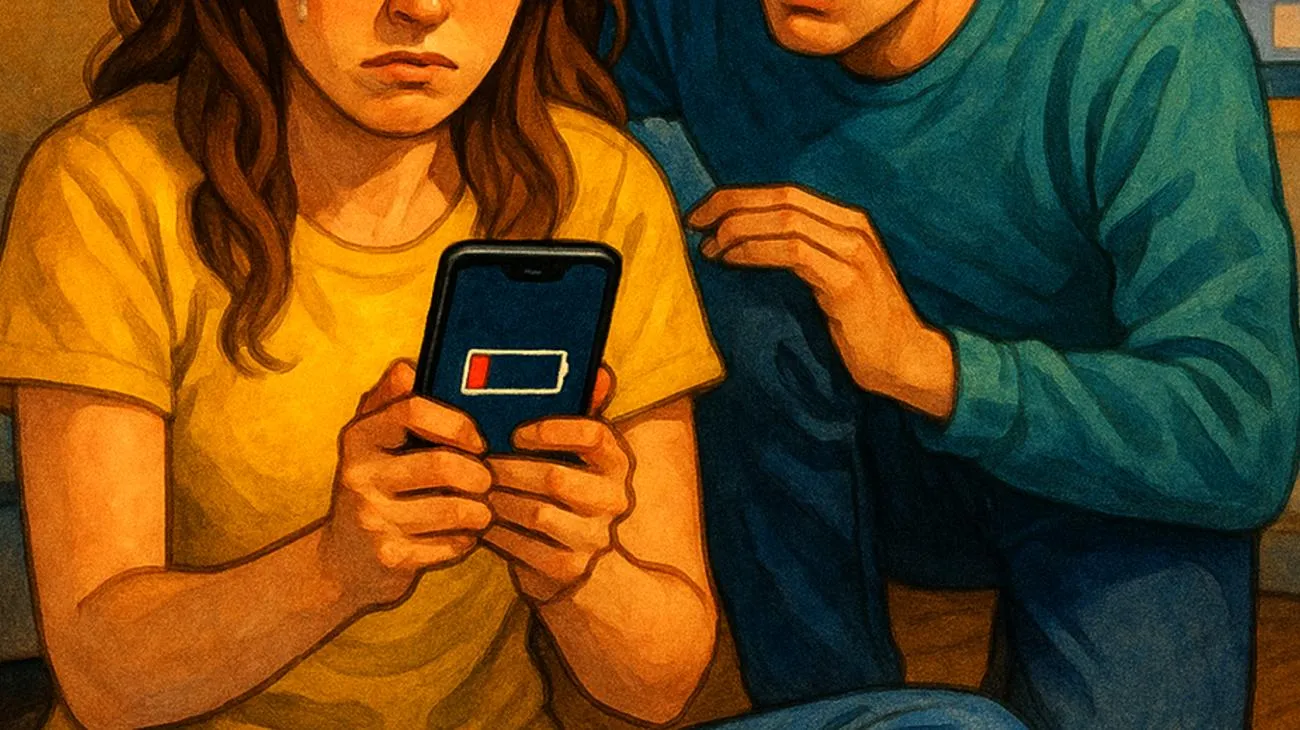Your phone battery hits that dreaded red zone, and suddenly your chest tightens. Your palms get sweaty. You feel like the world is ending because you might miss that Instagram story or WhatsApp message from your group chat. Sound familiar? Welcome to the club nobody wants to join but millions have accidentally become members of: people with nomophobia.
Before you start googling whether this is a real thing or just another internet buzzword, let us save you the trouble. Nomophobia is absolutely legitimate, backed by serious psychological research, and it might be affecting way more people in the UAE than you’d expect. In fact, recent studies show that up to 77% of young adults experience moderate to severe nomophobia symptoms. That’s not just being attached to your phone – that’s full-blown anxiety territory.
What The Heck Is Nomophobia Anyway?
Nomophobia stands for “no-mobile-phone phobia,” and it’s exactly what it sounds like: the fear or anxiety of being without access to your mobile phone. Think of it as separation anxiety, but instead of missing your mom when she drops you off at school, you’re panicking about being separated from your iPhone.
This isn’t some made-up condition that social media influencers invented to get more followers. A comprehensive study published in 2024 involving 200 young adults found that the vast majority experienced moderate to severe nomophobia, with direct connections to anxiety disorders, depression, and various physical symptoms. Another research study from 2023 focusing on adolescents discovered that a whopping 76.7% experienced severe nomophobia, particularly linked to stress and social isolation.
The psychological community treats this seriously because nomophobia taps into some of our most fundamental human needs: connection, security, and that nagging fear of missing out on something important. Essentially, our brains have been rewired to treat smartphones like essential survival equipment.
The Dead Giveaways That You Might Have Nomophobia
Recognizing nomophobia can be tricky because, honestly, we all feel a bit anxious when our phones die. But there’s a massive difference between mild inconvenience and genuine psychological distress that interferes with your daily life.
The Phantom Buzz Mystery
Ever felt your phone vibrate in your pocket, rushed to check it, and found absolutely nothing? Congratulations, you’ve experienced phantom vibration syndrome, and you’re definitely not alone. Research shows this happens to up to 90% of frequent phone users. Your brain becomes so hyper-alert to potential notifications that it starts creating false alarms. It’s like having an overly sensitive car alarm that goes off when a leaf touches the windshield.
Physical Symptoms That Feel Too Real
When separated from their phones, people with nomophobia often experience legitimate physical symptoms: increased heart rate, sweating, trembling, shortness of breath, and even nausea. These aren’t dramatic overreactions – they’re the same symptoms you’d see in other recognized anxiety disorders. Your body is literally treating phone separation as a genuine threat to your wellbeing.
Research has established strong connections between nomophobia and sleep problems. If you find yourself checking your phone multiple times during the night, feeling anxious about turning it off before bed, or sleeping with it literally under your pillow, this could indicate that sleep gets hijacked by your device. This disruption goes far beyond normal use patterns and enters problematic territory.
The Brain Science Behind Why We Go Absolutely Bonkers
Understanding nomophobia requires diving into some fascinating psychological principles that explain why our brains essentially stage a rebellion when we can’t access our phones.
The Uncertainty Reduction Obsession
Humans are naturally uncomfortable with uncertainty because not knowing stuff used to be genuinely dangerous for our survival. Our phones have become tools for reducing uncertainty about literally everything – from weather forecasts to whether that person we texted three minutes ago is mad at us. When we can’t access this information, our ancient survival brain interprets it as a potential threat.
The Dopamine Addiction Cycle
Every notification, like, or message triggers a small release of dopamine – your brain’s reward chemical. Over time, we become conditioned to expect these micro-rewards throughout the day. When they’re absent because we can’t access our phones, our brains create genuine psychological distress. It’s similar to how other behavioral addictions develop and maintain their grip on people.
Phones have become extensions of our social connections through messaging apps, social media platforms, and constant communication channels. Our devices help maintain the social bonds that are crucial for psychological wellbeing. Losing phone access can trigger the same neural pathways associated with social isolation and abandonment fears – basically, your brain thinks you’re being socially rejected when you’re really just out of battery.
Why Nomophobia Hits Different In The UAE
In a digitally advanced society like the UAE, where smartphone penetration rates exceed 98%, nomophobia takes on unique characteristics. The emphasis on constant connectivity for both business and social purposes means that being without a phone isn’t just inconvenient – it can feel like professional and social suicide.
The multicultural nature of Emirates society also creates additional layers of phone dependency. Many residents rely heavily on their devices to maintain connections with family and friends across different time zones. Missing a call or message might mean missing important news from loved ones thousands of miles away, which adds legitimate anxiety on top of the psychological dependency.
Additionally, the UAE’s fast-paced business environment, where deals can be made via WhatsApp and professional opportunities might come through social media, creates a culture where being unreachable feels genuinely risky for career advancement.
When Phone Anxiety Becomes A Serious Problem
It’s crucial to distinguish between normal phone dependency and problematic nomophobia that might require professional attention. Psychologists look for several key factors when assessing whether someone’s phone anxiety has crossed into concerning territory.
The intensity of your reactions matters significantly. Feeling mildly annoyed when your battery dies is completely normal. Having a panic attack, experiencing physical symptoms, or feeling genuinely distressed for extended periods suggests something more serious is happening that warrants attention.
Duration is another important factor. Healthy phone attachment involves some initial discomfort when separated from your device, but this feeling should subside relatively quickly once you’ve logically assessed that being without your phone temporarily won’t cause real harm. If anxiety persists for hours or creates lasting distress, this indicates a problematic pattern worth addressing.
The Domino Effect On Your Mental Health
Recent research reveals that nomophobia isn’t just an isolated quirk – it’s often connected to broader mental health patterns that can significantly impact overall wellbeing. Studies have found strong correlations between severe nomophobia and increased rates of anxiety disorders, depression, and somatic complaints, which are physical symptoms without clear medical causes.
The relationship appears to work both ways, creating a problematic feedback loop. People with existing anxiety tendencies may be more prone to developing nomophobia, while excessive phone dependency can also contribute to increased overall anxiety levels. It’s like anxiety and phone attachment feed into each other, making both problems worse over time.
Sleep quality becomes a major casualty in this cycle. The blue light from phone screens disrupts natural sleep patterns, but for people with nomophobia, the psychological need to stay connected can override healthy sleep habits entirely. This creates a cascade of health impacts, as poor sleep affects everything from immune function to emotional regulation and cognitive performance.
Breaking Free From The Phone Prison
If you recognize nomophobic patterns in yourself, don’t panic – awareness is genuinely the first step toward developing healthier habits. The goal isn’t to abandon technology entirely, because that’s neither realistic nor necessary in today’s world. Instead, focus on developing a more balanced relationship with your devices.
Research shows that limiting social media use can significantly improve psychological wellbeing and reduce technology-related anxiety. Start with small experiments in phone separation by trying these practical strategies:
- Leave your device in another room for thirty minutes while you read, exercise, or have a meal
- Create specific phone-free zones or times in your daily routine, such as during meals or before bedtime
- Practice mindful awareness of your physical and emotional responses without judging them harshly
- Gradually build tolerance for discomfort, like slowly building up your tolerance for spicy food
Many people find that creating boundaries around meals, bedtime, or family time helps reduce overall dependency while improving real-world connections and relationships. If your nomophobia symptoms are severe or interfering with your daily life, don’t hesitate to seek professional help. Cognitive-behavioral therapy has shown promising results for technology-related anxiety disorders.
You’re Not Broken, You’re Just Human In A Digital World
Nomophobia might sound like a silly modern problem when you first hear about it, but the research clearly shows it’s a legitimate psychological phenomenon affecting millions of people worldwide. The fact that up to 77% of young adults experience moderate to severe symptoms tells us this isn’t about individual weakness or character flaws – it’s about how our ancient brains are adapting to unprecedented technological changes.
Recognizing nomophobia in yourself isn’t a sign of failure or weakness. It’s evidence of self-awareness and represents the first step toward healthier digital habits that can improve your overall quality of life. In a world where constant connectivity is increasingly expected, learning to manage our relationship with technology isn’t just helpful – it’s essential for long-term mental health and wellbeing.
Your phone is ultimately a tool designed to enhance your life, not control it. While smartphones can certainly improve your life in countless ways, you existed before these devices became ubiquitous, and you’re fully capable of existing without them – even if your anxious brain temporarily tries to convince you otherwise. The key is finding that sweet spot where technology serves your life goals rather than dominating them completely.
Table of Contents

